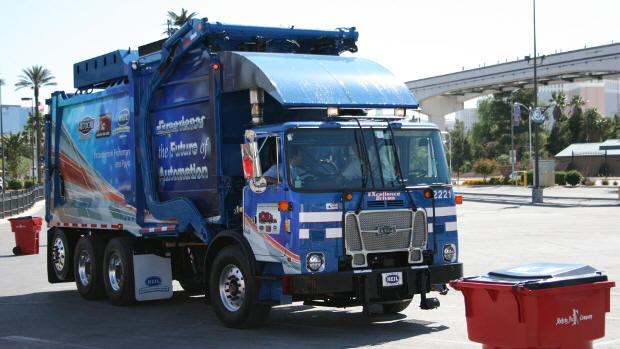Alternative-fueled fleets becoming more viable
Waste Fleet Conference panel to discuss options for alternative fuel vehicles
- June 12, 2012
- By Jeremy Carroll
 Douglas D. Fisher, Waste & Recycling News
Experts say when adding an alternatively
fueled truck, like one that is powered with CNG, preparation is
key for a smooth transition.
Douglas D. Fisher, Waste & Recycling News
Experts say when adding an alternatively
fueled truck, like one that is powered with CNG, preparation is
key for a smooth transition. When adding an alternative-fuel vehicle to a large fleet, it's all about getting the preparation correct, said Demond Hammond, a project specialist who helps manage a fleet of vehicles and equipment for Roanoke, Va.
"The challenge for us is to ask all the right questions so we don't get blindsided," he said. "Get the training for the vehicles for our technicians, so they can feel comfortable."
Often, mechanics need to be trained on how to fix the vehicles because even if they are covered under warranty, regular maintenance will be required. Sometimes, the local dealership might not be knowledgeable on the vehicle.
Hammond will be on a panel to discuss alternative fuels in fleets at the Waste Fleet Conference in Indianapolis June 13 with Gary Simmons, vice president of fleet operators with Casella Waste Systems; Mike Davis, vice president of operations with Republic Services Inc.; and Tim Hooker, director of business development at Fyda Energy Solutions.
For Roanoke, diving into alternative-fuel vehicles is something the city has been doing for years, with many different types of vehicles. Hammond said the city started with biodiesel, used ethanol, has hybrids, electric vehicles and propane for equipment. The city's garbage trucks run on a biodiesel blend.
It plans to move to compressed natural gas (CNG) in the future, and had been gearing up for a public-private partnership on a CNG station, but it fell through. Hammond said the city doesn't have the funding to build a $500,000 fueling station on its own.
"It just doesn't make sense at this [time] to put up that infrastructure," Hammond said.
But that hasn't stopped the city from preparing for the eventual day when CNG trucks are picking up residents' garbage.
He said the city takes its trash to a transfer station, where it is shipped by rail to a landfill about 20 miles away. Eventually, the landfill may pipe landfill gas back to the transfer station to be used to power trucks.
Hammond said it will also be testing hybrid automated side-loaders for garbage pickup soon.
Finding grants for converting fleets to alternative fuels is very difficult on the federal level, said Kellie Walsh, executive director of the Greater Indiana Clean Cities Coalition.
"Right now there isn't a lot of money for anything," she said.
Walsh will be talking about funding options at the Waste Fleet Conference at 2:30 p.m. on June 13. Her organization has helped fleets secure $20 million in grants over the past 10 years to convert vehicles to various alternative-fuel models.
"We're fuel neutral, so we look at what fuel or technology makes the most sense for them," she said.
Due to funding drying up, one of the easiest conversions a fleet can use is a biodiesel blend, which is about 20 cents a gallon cheaper than regular diesel.
"It's an easy way to reduce fuel costs, and it can reduce maintenance costs," she said.
Some states do have programs to encourage alternative-fuel vehicles, Walsh said. Some of the projects getting funding right now are those that help fully implement technology, like connecting dots on fueling stations.
Securing funding for the entire project is often the first and most difficult hurdle to get over, Hammond said. They have been fortunate at Roanoke, he said, because the director in charge of fleet management is also in charge of sustainability.
"It's great because we don't get push-back from senior management, but for some, they don't have that luxury," he said.
![]()
w w w . w a s t e r e c y c l i n g n e w s . c o m
copyright 2012 by Crain Communications Inc. All rights reserved.